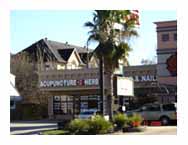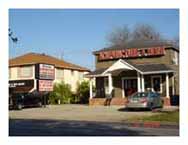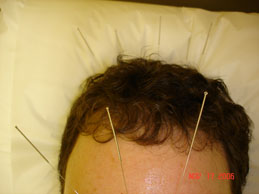| |
|
Acupuncture
in Houston, TX - Houston Acupuncture & Herb Clinic
2405 South Shepherd, Houston, TX 77019.
TEL: 713-529-8332.
2431 West Holcombe, Houston, TX 77030. TEL:
713-666-5667.
We are one of the best, biggest, and oldest acupuncture clinics in
Houston area. |
|
☺Acupuncture Houston TX - West Holcombe Clinic |
☺Acupuncture Houston TX - South Shepherd Clinic |
 |
Houston Acupuncture and Herb Clinic at 2431 West Holcombe, Houston,
TX. @ the
corner of Kirby
Drive and next to the Flower Corner.
713-666-5667 |
 |
Houston Acupuncture and Herb Clinic at South Shepherd Dr., Houston,
TX@ the
corner of Westheimer
Drive and next to the KFC. This location has been
servicing Houston for more than18 years. |
Click here for the West Holcombe Clinic location
map.
The clinic is located at the corner of
Kirby Drive and
next to the Flower Corner.
☺TEL:
713-666-5667. |
Click here for the
South Shepherd Clinic location map.
Acupuncture Houston TX-South
Shepherd Clinic
☺TEL: 713-529-8332.
|
|
Acupuncture and Chinese medicine help pain,
low back pain/
shoulder pain/ migraine/ neck pain/ knee pain/ ankle pain
chest pain/ leg pain/ hip pain/ heel pain/feet pain /swelling
sports injury/ sciatica pain/ pinched nerve/numbness
Chest Pain, Chest Bi, Heart Pain,
Angina Pectoris in Chinese medicine
Testimonial
Male,
age around 50. I some times felt little discomfort in the chest.
Gradually the discomfort became more frequent. I went to see the
family doctor about this problem, but the answer was always nothing
wrong.
After times my chest felt much heavier and very uncomfortable, plus
cold sweats. I went to get acupuncture treatment at Houston
Acupuncture and Herb Clinic. Right after the acupuncture treatment,
my chest pressure relieved and the cold sweat stopped. I felt
normal again. I have told by the acupuncturist that I might have
angina, and suggested me to see the specialist to get thorough exam
for my heart. After all the exams, the diagnosis was angina
pectoris.
I
really appreciate the clinic helped me for my severe problem, and
gave me correct information about my sickness. Because of that, I
won’t delay my heart condition to get right treatment.
The
acupuncture and herb treatment helped me a lot for my heart
condition. I have no more chest pain and heaviness.
Testimonial:
R.T. I went
to emergency room for severe heart problem, I almost die.
I have been to Dr Wu for 3 years. He has cured
my heart condition (a cardiologist nearly made me bed ridden), sinus
infections, flu, anxiety…I can honestly say everything I have ever
come in for treatment, I have been successfully healthy.
P. T. Dr. Wu You have been great. I read a lot about
acupuncture prior to coming and trying it. My question to my self
was, before western medicine how did African and Asia here.
Angina,
or angina pectoris, is a symptom due to coronary atheriosclerosis
heart diseases. Because of the atherosclerosis, it frequently causes
epicardial coronary artery stenosis. The clinical manifestation is
chest pain, pressure or discomfort.
Angina arises from a situation called
myocardial ischemia, which is due to the insufficiency of oxygen and
myocardial blood supply, or vasospasm of coronary arteries. Angina
is a common symptom for coronary heart disease or coronary artery
disease. During the exercise state, the heart rate and myocardial
contraction are increased and it also increases the myocardial
oxygen demand. Therefore the coronary blood flow and oxygen
extraction must be increased to meet the requirement of myocardium.
The maximum of coronary blood flow is about 6 times of the resting
coronary blood flow.
When myocardial ischemia happens, most patients
will feel chest pain in middle or upper part of the chest behind the
sternum. Besides that, the chest pain are also associated with
oppressive, and unpleasant pressure, heaviness, fullness, burning,
crushing and squeezing pain, strangling, suffocation sensation in
the chest, tightness, a heavy weight, or a choking sensation.
Besides the chest discomfort, the discomfort may also be experienced
in the upper back, between the shoulder blades, jaw, and a
constricting sensation in the throat, neck, epigastria, elbow, hand,
or arm. In severe cases, the patient may exhibit nausea, vomiting,
and a pale face with sweating.
Sometimes, the symptoms manifest in the left
side of chest. The discomfort can also radiate to the right side of
the jaw, arm, teeth, and ears. However, the episode of angina
pectoris is temporary and not a heart attack. So the patient should
not worry too much. But it does indicate an increased risk of heart
attack, acute myocardial infarction (heart attack), severe cardiac
arrhythmias, ventricular tachycardia and fibrillation.
In Chinese medicine the syndrome of
chest Bi, chest pain, or heart pain results from the vasospasm or
obstruction of heart blood vessels.
The syndrome of chest bi, chest pain, or heart pain is similar to
the angina pectoris and myocardial infarction in Western medicine.
In here, we only discuss the angina. Among the myocardial
infarction. We will discuss later.
Etiology and pathogenesis of heart
pain / chest Bi:
The
Chest Bi and Heart pain is related to the excess and deficiency of
liver, heart, spleen, and kidney. The root of the disease originates
from the deficiency of heart due to the insufficiency of Qi, blood,
Yin, and Yang. Later, the phlegm, blood stasis, Qi stagnation,
accumulation of cold gradually causes the blockage of heart blood
vessels. After that, the chest yang and Qi flow becomes obstructed
due to excessive stimulation from excessive emotion, overeating,
heavy meals, smoking, etc. the vasospasm of heart channel and
blockage of blood develops. In the beginning, the formation and
development of the chest Bi frequently appears as excess syndrome
instead of deficient syndrome. But later, the clinic manifestation
always shows a combination of both excess and deficient syndromes.
The etiology and pathogenesis can be
classified into 4 factors:
1. Inner invasion due to pathogenic cold:
Most patient has a yang deficiency due to a weak constitution. The
deficiency of chest yang with overwork causes the attack of
pathogenic cold. Finally the extreme cold temperature induces the
stagnant Qi and blood accumulation. It result blockage of chest yang
and impairment of Qi flow. The chest Bi is developed.
2. Chest pain due to Improper diet:
a.
Excessive intake of alcohol and carbonated drinks impair the
spleen yang. The transformation and transportation functions of the
spleen are damaged. The transformation of heat damages the yin and
causes the formation of phlegm.
b. Or the impairment of transformation and transportation of
spleen yang result in accumulation of damp heat due to over-eating
of greasy food. The stagnation accumulates in the middle Jiao. The
pathogenic heat overheats the yin and phlegm is subsequently
developed.
c. Finally the phlegm blocks the blood vessel and Qi
dynamics. Chest pain subsequently develops.
3. Chest pain due to emotional stress:
a. Anger damages the liver Qi and causes the Liver Qi
stagnation. The stagnation of liver Qi gradually causes the blood
stasis. In the severe cases, the stagnation of liver Qi turns into
fire and depletes the yin. Phlegm is subsequently developed.
b. Or when spleen function is suppressed by liver
stagnation, transportation and transformation of spleen Qi is
restricted due to the obstruction of ascending and descending spleen
Qi. The damp phlegm is therefore accumulated.
c. However, whether the reason is Qi stagnation, blood
stasis, or phlegm obstruction, all can cause the abnormal blood
circulation and narrowing of blood vessels. The chest yang becomes
restricted and Qi dynamic loses the smooth flow. The chest bi
syndrome then develops.
4. Chest pain due to deficiency of liver and kidney:
a. Deficiency of kidney Qi and kidney yang is due to old age,
prenatal deficiency, and excessive sexual activity. Once the kidney
yang becomes deficient, the deficiency of spleen yang and heart yang
will follow. Similarly, once the kidney yin becomes deficient, the
liver yin and heart yin becomes deficient too. The yin and yang
deficiency finally leads to obstruction phlegm, blood stasis,
stagnant Qi, and cold accumulation. Therefore the chest yang becomes
obstruction; the Qi dynamic is not smooth; chest pain is developed
due to vasospasm or obstruction of blood vessels.
Differentiation of character of
chest pain:
1. Determination
of pain characters:
a. Stabbing pain
·
Due to
obstruction of blood stasis

·
Due to
interior obstruction of turbid phlegm
b. Burning pain
·
Due to
yin deficiency of heart and kidney
c. Squeezing pain
·
Due to
accumulation of Yin coldness, called cold accumulation in cardiac
vessel.
d. Stuffy pain
·
Due to
deficiency of Qi and Yin
·
Due to
yang deficiency of heat and kidney
·
Interior obstruction of turbid phlegm
2. Determination of
deficiency of Qi, blood, yin, and yang
a. Qi deficiency
·
Clinical expressions such as shortness of breath, fatigue,
palpitation, chest pain with stuffy sensation.
b. Yang deficiency:
·
Qi
deficiency plus spontaneous sweating and pale face, and aversion to
cold of all four limbs
c. Blood deficiency:
·
Clinical expressions such as palpitation, insomnia, a lot of
dreaming, loss of luster in the face.
d. Yin deficiency:
·
Blood
deficiency plus anxiety, dry mouth, and night sweating.
e. Depletion of yang
·
Extreme cold aversion in the four limbs, profuse perspiration.
3. Determination of Qi
stagnation, blood stasis, obstructive phlegm, cold accumulation
a. Qi stagnation:
·
Chest
has discomfort
·
Hypochondriac pain
b. Blood stasis
·
Stabbing at chest area
·
Dark
and unclear face
·
Purple
color in mouth, lips, and nails.
·
Tongue
becomes greenish; sometimes appearing with blood plaque or blood
points.
c. Cold accumulation:
·
Stabbing pain at the chest area
·
Extreme coldness at four limbs
·
Greenish white color of the face
d. Obstructive phlegm:
·
Discomfort in the chest area
·
Heaviness of the four limbs
·
Nausea
and dizziness
·
Yellowish white color of face with puffiness
·
Tongue
has teeth indentation marks around the edge.
·
Tongue
coating is whitish greasy or yellowish greasy.
Treatment according to the
differentiation of syndromes of Qi stagnation:
1. Deficiency of both Yin
and Qi
a.
Qi deficiency
Fatigue, shortness of breath, lassitude
b. Yin deficiency
·
Blood
deficiency and palpitation
·
Yin
deficiency plus blood deficiency with heat in the center of feet and
palms
c. Major symptoms:
·
Paroxysmal pain happening with irregular timing
d. Sub-symptoms:
·
Anxiety, palpitation, heat in the center of feet and palms due to
yin deficiency
·
Fatigue, shortness of breathe, vertigo due to Qi deficiency.
e. Treatment principle: Replenishing yang Qi and nourishing
the yin
f. Chinese medicine treatments:
·
Sheng
mai san plus ren shen yang ying tang or Sheng mai san plus Zi gan
cao tang
2. Yang deficiency of heart and
kidney:
a. Main symptoms: chest pain with stuffy sensation,
shortness of breath, being aggravated after exposure to cold.
b. Sub-symptoms:
·
Palpitation, sweating, soreness of lower back, fatigue, aversion to
cold and cold limbs.
·
Or
chest pain radiating to the back, extreme coldness of four limbs
·
Wheezing manifests during movement, cannot lay down to sleep, puffy
face and swollen feet.
c. Treatments:
·
Replenishing Qi and strengthen yang, warming collateral and stop the
pain
d. Chinese Medicine treatment:
·
Shen
Fu Tang plus you Gui Yin or modified shen fu tang
3.
Yin deficiency of heart and kidney:
e. Main symptom:
·
Stuffy
chest pain or burning pain, palpitation and anxiousness.
f. Sub-symptoms:
·
Inability to sleep, night sweating, stuffy chest with stabbing pain.
·
Soreness and weakness at lower back and knees, tinnitus, or
dizziness and vertigo.
·
Or
tidal fever in the face, sweating, shortness of breath, fullness
pain at hypochondriac area.
g. Treatment method:
·
Nourishing yin and replenishing the kidney, nourishing the heart and
calming the spirit
h. Chinese medicine treatment:
·
Zuo
Gui Yin
·
Tang
wang bu yin tang
4. Accumulation due to yin coldness
a. Main symptoms:
·
Squeezing pain at the chest with irregular timing, pain being
aggravated after exposure to cold.
b. Sub-symptoms:
·
Stuffy
chest, shortness of breath, palpitation, pale face, cold
extremities.
·
Chest
pain radiating to the back, or back pain radiating to the chest.
c. Treatment methods:
·
Warming yang, opening the channel and dispelling the cold.
d. Chinese medicine treatments:
·
Modified gua lou xie bai bai jiu tang.
·
Tong
mai si ni tang
5. Heart obstruction due to blood
stasis:
a. Main symptoms:
·
Stabbing pain with fixed location, being aggravated after sleep.
b. Sub-symptoms:
·
Stuffy
chest, palpitation, comes and goes, it becomes a chronic condition.
·
Or
severe chest pain due to a sudden anger.
c. Treatment methods:
·
Invigorate blood and transform the stasis, open the channel and stop
the pain.
D.
Chinese medicine treatments:
·
Modified Xue fu zhu yu tang
6. Interior obstruction due to
turbid phlegm:
a. Main symptom;
·
Stuffy
chest pain with suffocating sensation
·
Chest
pain radiates to back
b. Sub-symptoms:
·
Fatigue, shortness, four limbs feel heaviness, lot phlegm.
·
Or
sometimes being stuffy stabbing chest pain or burning chest pain.
c. Treatment methods:
·
Open
the flow of yang Qi to disperse the turbidity, dispelling the phlegm
to open the obstruction.
d. Chinese medicine treatments:
·
Modified Gua lou xie bai ban xie tang
Acupuncture treatment:
When treating the chest pain with acupuncture, the acupuncture
points should be chosen at heart and pericardium channels.
1.
Main acupuncture points for chest pain:
·
Nei
Koun, heart shu, tang chung, jueyin shu, zhu que, zu san li.
2.
Sub-main acupuncture points for chest pain:
·
blood
stasis: go shu, yin xi
·
deficiency of Qi and Yin: Yin xi, tai xie, san yin cho
·
deficiency of heart yang: min ming, chu che
·
obstruction of turbid phlegm: chong wan, fong long
·
sudden
loss of yang Qi: kun yan moxibustion, Qi hei moxibustion
3.
Ear acupuncture for chest pain:
·
Heart
point, pi zi xio point, sympathetic points
4.
Special preparation formula for chest pain:
·
dan
shen, huang qi, Shui zhi, Bing pian
·
san
chi, Huang qi
·
ren
shang, mai dong, shan chi.
|
|
Office Hours:
|
| Monday - Friday |
9:00 am - 6:00 pm |
| Saturday |
9:00 am - 1:00 pm |
|
|
|
2. Houston Acupuncture and Herb Clinic- West Holcombe
Location:
2431 West Holcombe @Kirby
(between
Kirby and Fannin Street), Houston, TX 77030.
Tel: 713-666-5667
The clinic is located at the corner of
Kirby Drive
and next to Flower Corner.
☺TEL:
713-666-5667.
Click here for the location
map.
|

 |
| |
|
 |
| Copyright © Houston Acupuncture and Herb
Clinic, 2405 South Shepherd, Houston, TX 77019, TEL:713-5298332. 2431
West Holcombe BLVD, Houston, TX 77030, TEL: 713-6665667. All rights reserved. No part of this publication
protected by this copyright may be reproduced or utilized in any form or by any means, without written permission from the copyright owners. |
|
|

